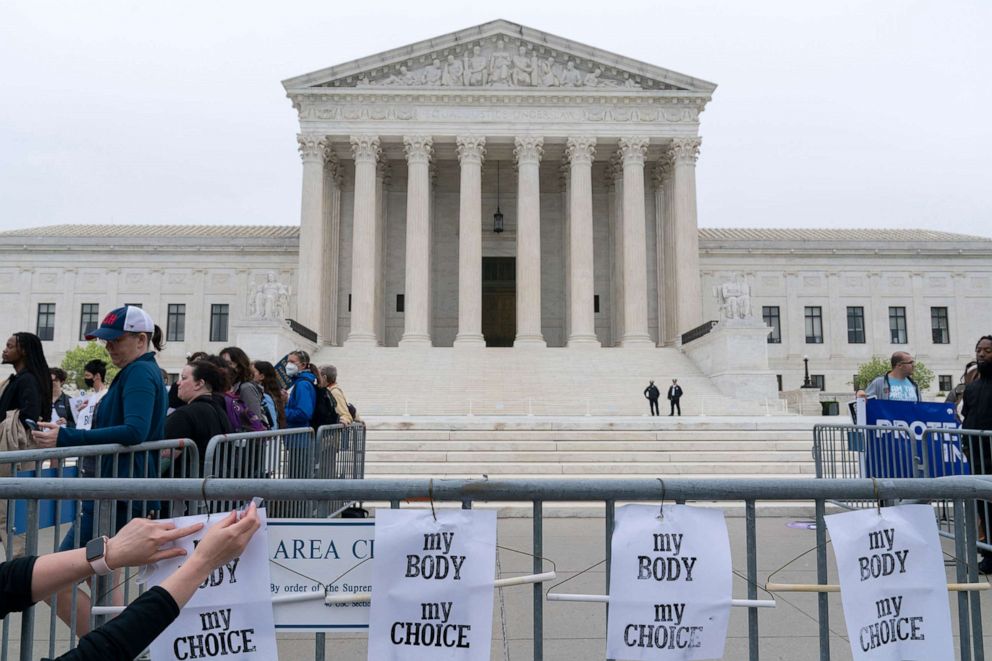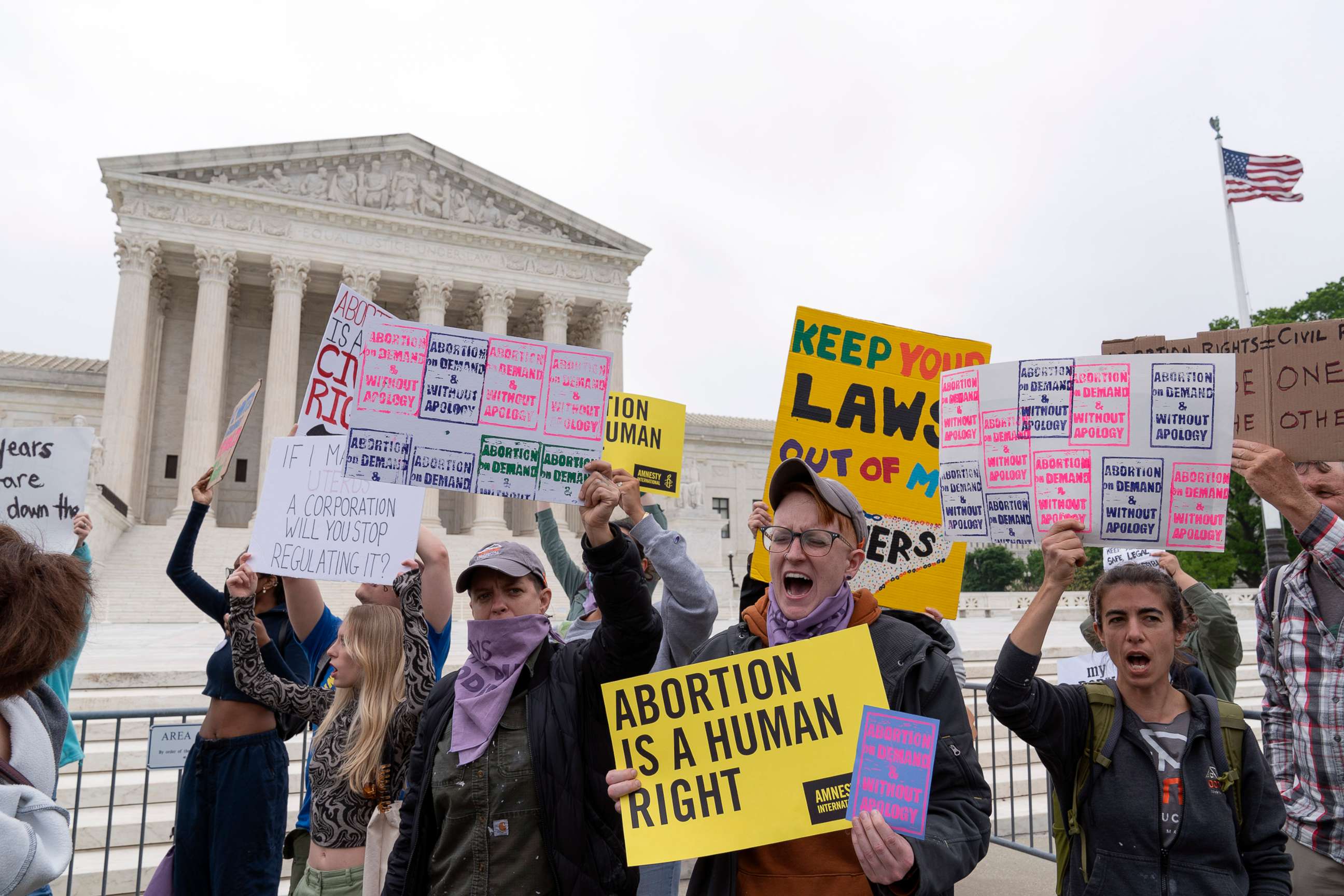Trumpism becomes fresh issue after leak of abortion decision: ANALYSIS
The decision could upend politics in ways that shape the midterms and beyond.
The adage deserves an addendum. Elections indeed have consequences -- and they don’t come with an expiration date.
You can draw a straight line from Donald Trump’s election as president to the shocking leak late Monday of a Supreme Court draft opinion that would end the constitutional right to an abortion.
You could start that line a decade and a half earlier, with George W. Bush’s disputed and narrow win, also with a popular-vote minority. It could even trace way back to 1973, when Roe v. Wade short-circuited state-level abortion politics and wound up energizing generations of conservative activists.
The upshot is that a court with six appointees made by Republican presidents and only three by Democrats appears ready to uproot a half century of precedent on the personal and visceral issue of a woman’s right to choose.
That word got out with a precedent-shattering leak from inside the high court only reinforces how much and how quickly expectations and traditions of Washington have changed – and, to Democrats’ minds, who is to blame for what comes now.

In a scathing and unusual joint statement late Monday, Senate Majority Leader Chuck Schumer and House Speaker Nancy Pelosi blamed “every Republican senator,” Senate Minority Leader Mitch McConnell in particular, as well as “Trump justices” whom they said misled senators about the importance of following precedent.
“The Republican-appointed Justices’ reported votes to overturn Roe v. Wade would go down as an abomination, one of the worst and most damaging decisions in modern history,” Schumer and Pelosi said.
Implicit in this argument is that all Republicans – even those who have broken with Trump publicly – should be held responsible at the ballot box for the four years of Trump’s presidency.
It was McConnell’s decision to fill the late Justice Ruth Bader Ginsburg’s seat inside the seven weeks before the 2020 election – after famously holding the late Justice Antonin Scalia’s seat open for the last 11 months of the Obama presidency – that created the majority that has Roe ready to fall.
There’s even a not-subtle way for Democrats to connect this to the insurrection at the Capitol on Jan. 6, 2021.
“The central choice in the 2022 elections will be about who will defend our freedom,” said Rep. Sean Patrick Maloney, D-N.Y., the chairman of the Democratic Congressional Campaign Committee. “Democrats will fight like hell to protect them; Republicans will rip them away.”
The origin and motivations of the leak have become quick Washington fodder. Liberals see potential conservative culprits, part of an inside-job effort to lock in the votes of week-kneed justices; conservatives pointed in the direction of the chambers of liberal justices who might still want a different outcome.
“This is an attack on the court,” said Sen. Marsha Blackburn, R-Tenn., an opponent of abortion rights.
But if the decision holds, it will upend politics in ways that will shape the midterms and well beyond – regardless of who was behind the leak itself. That’s in part because it seems like the country is not prepared for what comes next, either in terms of politics or questions of basic access to abortion services that have been a given for every American of child-bearing age since 1973.
An ABC News/Washington Post poll in the field just last week found that 58% of Americans say abortion should be legal in all or most cases – a level roughly consistent with where it’s been for decades.
Fifty-four percent in the poll said the Supreme Court should uphold Roe, with only 28% saying it should be overturned. Perhaps more striking: 70% said the decision about whether a woman can have an abortion should be left to the woman and her doctor – something that will not be the case in dozens of states if Roe is uprooted.
It also appears that many Americans haven’t been paying close attention to debates coursing through red-leaning statehouses in recent years. In the 22 states that have passed new abortion restrictions since 2020, just 30% of residents in the poll said they are aware those restrictions have passed, compared to 44% who believe they haven’t passed.
Those numbers are bound to change, and quickly. Democrats will be making it a defining issue in campaigns, and so will Republicans, with conservative-led states readying new legislation to pare back abortion rights once the Supreme Court gives them the green light.

Overturning Roe will be a cause for celebration for activists who see abortion as akin to murder, and their long-running push to eradicate legal abortion will not end with the demise of Roe.
“If Roe is indeed overturned, our job will be to build consensus for the strongest protections possible for unborn children and women in every legislature,” said Marjorie Dannenfelser, president of the Susan B. Anthony List, a prominent anti-abortion political group.
The leak landed at a moment of maximum unpredictability in politics. Midterm voting began in earnest on Tuesday, with contests in Ohio and Indiana that will test the political sway of Trump and President Joe Biden -- all with a wild card of an emerging new reality around abortion rights.
Biden’s initial statement responding to the leak acknowledged the political realities and urgencies he sees at this moment.
“It will fall on voters to elect pro-choice officials this November,” Biden said Tuesday. “At the federal level, we will need more pro-choice senators and a pro-choice majority in the House to adopt legislation that codifies Roe, which I will work to pass and sign into law.”
The Roe v. Wade decision was handed down Jan. 22, 1973. That was a mere 19 days into Biden’s Senate career, and the devoutly Catholic young senator said at the time he thought it went “too far” in establishing a constitutional right to abortion.
Biden now lines up with most of his party in holding a much different position. A portion of his political legacy will be defined by how voters react to what looks like the end of an era that has stretched for nearly half a century.




